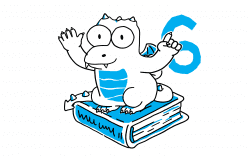The Great Flood changed everything. No longer could we trust that the sea would stay safely, tidily, behind its sea wall. No longer could we trust that all would be well. The world had been tipped upside-down for all of us. And even when the land dried out and the houses were rebuilt, even when new people came to live in the village and farmed the land and cleared the reens and worked the soil, it wasn’t the same. It wasn’t the same world any more. Those of us who had seen the waters rise, and lost so much to the sea, we were never the same again.
But time passed and time heals everything.
It’s been four hundred years since the flood. And, as you can see, people have kept coming here, to live and work and walk and play. This lake was made to keep the land safe from the sea, to keep the land drained, so that all these new houses could be built. There must be something special about this place, don’t you think, that people keep coming here? And those that leave, they come back?
Mam wasn’t one of the ones who came back. I like to think she went on, somewhere new, somewhere even more beautiful. Perhaps to the lost land under the sea, the realm of Cantre’r Gwaelod, that she always used to tell me stories about. Betsi and I waited for a long, long time, but she never came back. It was terrible, of course it was, to begin with. But I had to keep going. I knew she’d want me to. I mended the thatch of the cottage, I fixed the broken door, I slowly scrubbed the smell of the sea from the stone.
And slowly, spring came, after the longest winter that had ever been. And with spring came hope. Just like our neighbour, the people of the village took care of me. They brought me young chicks, to rear myself, until soon I had a whole brood of chickens and more eggs than I knew what to do with, Betsi shepherding them around carefully, wiser for her adventure up the tree.
And when harvest came, I climbed the trees and picked the apples myself, and made cider the way Mam had taught me to.
I sometimes think she was there with me, in that first year after she was lost. I saw her in everything. In the warm eggs left by the chickens as they strutted out into the sunlight every morning, following Betsi. In the first blackberries growing in the hedgerows. And one morning I woke to find that she must have been there, because on the front step of the cottage was a basket, a wickerwork basket, with a red cloth inside. It was a bit battered from its journey to the heart of the ocean and back again, but it was still good enough for collecting eggs.
I like to think that a bit of Mam came back to me, to check that I was all right.
Time’s passing even now. And my time’s up. That’s my story. Except, can I ask one final thing of you?
You know, even when I was all grown up, people still called me Chicken. Can you say my name now? Can you say it loud and clear, out to the lake and the birds and the memories of all the people who used to live here? So once again I can be remembered, for the extraordinary life I lived, right here, where you’re standing now.
Say it as you wander up the reen in front of you. This reen is ancient. It’s been here much longer than the lake. It’s part of the earth. Perhaps it’s been here as long as I have. You can walk up the bank of the reen, and then take a path to the left, leading you back to where you started. Think of me as you walk. Think of me walking paths just like this one, with the view of the reeds and the water, and chickens clucking behind me, so very long ago.
Off you go. Call out my name as you go!


